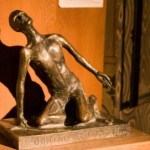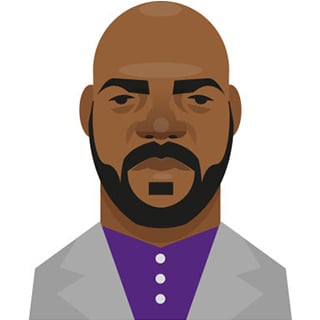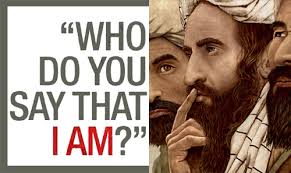 For all the Hallelujah choruses, creeds, basilicas and general hoopla that celebrate the name, Messiah, isn’t it, now and forever, the question in our hearts and cultures: Who is Jesus?
For all the Hallelujah choruses, creeds, basilicas and general hoopla that celebrate the name, Messiah, isn’t it, now and forever, the question in our hearts and cultures: Who is Jesus?
In Matthew’s gospel, Jesus asks the disciples, Who do people say I am? And they offer a number of names: Some say John, some say Elijah, some say Jeremiah or one of the prophets. And then Jesus asks, Who do you say I am? And Peter blurts: the Messiah! And then: Jesus blesses him for the revelation; names him the Rock on which the church will be founded, and tells him, for Pete’s sake, to hush it up.
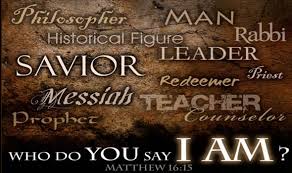 Messiah is a dangerous name, he knows. And in indescribable ways we still know that name to be dangerous, though perhaps we consider it more dangerous to us, and to general sanity in the culture, and to conventional churchiness, than to God. Perhaps the name is hard to say because we don’t really expect a Messiah anytime soon. Or perhaps we can’t bring ourselves to invoke such a profound altering of life’s possibilities, as a Messiah would bring.
Messiah is a dangerous name, he knows. And in indescribable ways we still know that name to be dangerous, though perhaps we consider it more dangerous to us, and to general sanity in the culture, and to conventional churchiness, than to God. Perhaps the name is hard to say because we don’t really expect a Messiah anytime soon. Or perhaps we can’t bring ourselves to invoke such a profound altering of life’s possibilities, as a Messiah would bring.
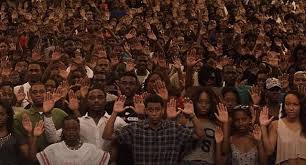 In these days of rioting in Ferguson, MO, after the death of young Michael Brown – in these days when we aren’t clear in our national mind whether that death was a breach of justice or an appropriate police action – in these days, when people of color in America experience this tragedy over and over, without any change in the way order is administered among us – in these days, there is a longing akin to the longing felt in Jesus’ era in Caesar’s order, for a new order.
In these days of rioting in Ferguson, MO, after the death of young Michael Brown – in these days when we aren’t clear in our national mind whether that death was a breach of justice or an appropriate police action – in these days, when people of color in America experience this tragedy over and over, without any change in the way order is administered among us – in these days, there is a longing akin to the longing felt in Jesus’ era in Caesar’s order, for a new order.
That very longing, that agony of tense living through days encrusted with salt tears and blood in the streets, was real when Moses was born in Pharoah’s empire. The story bears a similar outline to Matthew’s story of the revelation of the Messiah, and the two stories are to be read this week.
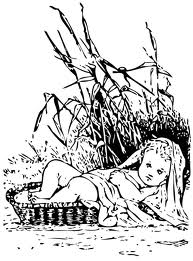 Pharoah feared an uprising, and ordered the midwives to kill male babies to prevent a Messiah (for that is really what Moses was) from arising. The Hebrew midwives, Shiphrah and Puah, resisted. What courage! For, if found out, they would have paid dearly, and their families, too.
Pharoah feared an uprising, and ordered the midwives to kill male babies to prevent a Messiah (for that is really what Moses was) from arising. The Hebrew midwives, Shiphrah and Puah, resisted. What courage! For, if found out, they would have paid dearly, and their families, too.
They let male babies live. And so the child Moses, like the Baby Jesus, was a hidden infant. At age two, when he can no longer be hidden from view, his mother puts him in the Nile in a basket, and Pharoah’s daughter fishes him out, saying, Look, here is one of the Jewish boys who didn’t die, and she takes him into Pharoah’s palace and raises him as her own son. What courage! Why is she not a Named Saint?
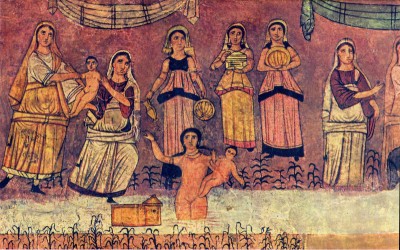 She engages Moses’ own mother as his nurse. Together, these two women raise up a man who will deliver his people from bondage. What an extraordinary household! In it they teach him what he must know to become Moses. They form his heart for his own people and his soul for naming the suffering of his people. Episcopal Bishop Michael Curry, in his book Crazy Christians, points out that Exodus honors a household of two women joined in raising a child for God – and by this sign all same gender couples raising children are blessed as families.
She engages Moses’ own mother as his nurse. Together, these two women raise up a man who will deliver his people from bondage. What an extraordinary household! In it they teach him what he must know to become Moses. They form his heart for his own people and his soul for naming the suffering of his people. Episcopal Bishop Michael Curry, in his book Crazy Christians, points out that Exodus honors a household of two women joined in raising a child for God – and by this sign all same gender couples raising children are blessed as families.
Here then are two readings about moments that point to a new order. Both call for the courage to resist the present order as unjust. And each moment is very aware of God’s messianic hope, and of grave danger.
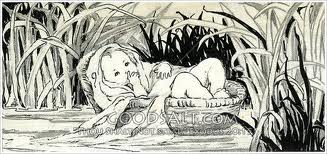 In Matthew’s story, Peter is Pharoah’s Daughter, fishing the name Messiah out of the river of possibilities. Peter and the disciples will midwive the birth of Jesus’ spirit into new bodies and into a new era. The raising of Jesus was done by his mother, who sang her fierce song dedicating his soul to the scattering of the proud, the felling of the mighty, the emptying of the rich and the filling of the hungry, before his birth. She was joined in raising him by the Archangel Gabriel and Joseph, in houses where Joseph contrived to hide him.
In Matthew’s story, Peter is Pharoah’s Daughter, fishing the name Messiah out of the river of possibilities. Peter and the disciples will midwive the birth of Jesus’ spirit into new bodies and into a new era. The raising of Jesus was done by his mother, who sang her fierce song dedicating his soul to the scattering of the proud, the felling of the mighty, the emptying of the rich and the filling of the hungry, before his birth. She was joined in raising him by the Archangel Gabriel and Joseph, in houses where Joseph contrived to hide him.
Moses and Jesus each had several occasions of naming and revelation. And still it is difficult for us to name them. Each, in our own time, is difficult to name as well. Part of the difficulty is that when we name them we have to name ourselves. Do we deny having faith? Do we have faith? Are we free? Have we courage to cross the waters of death? Are we in, or on the way to, the kingdom? Or are we in bondage here? Will we walk away from the body of Michael Brown in the street – or will we find some way to raise him?
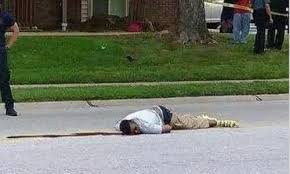 Who do you say I am? Michael Brown, in death, is asking us that, as are the people of Ferguson, MO. As are the people of Syria, Iraq, the Yazidis, the Kurds, and yes, Isis.
Who do you say I am? Michael Brown, in death, is asking us that, as are the people of Ferguson, MO. As are the people of Syria, Iraq, the Yazidis, the Kurds, and yes, Isis.
We are all mothers of God, wrote the German medieval mystic, Meister Eckert, for God is always waiting to be born. And he meant this for our times of conflict and terror, and for the bringing forth of a new order. He did not mean this as a Christmas greeting. He meant this.
Our desperation for deliverance, and God’s responsive moments of birth are eternal and eternally recurring, and they ask us to name them.
So: What Exodus are we willing to make? What Kingdom do we want to enter? Where are we now? And where are we heading? Who do we say Jesus is?
__________________________________________________
Illustrations:
1. Poster. Google Images.
2. Poster, Names. Google Images.
3. Demonstration in Ferguson, MO. Google Images.
4. Moses in the Bulrushes. Drawing. Google Images.
5. Sura-Europos Synagogue, Syria. Before 245. Shiphrah, Puah, Jocheved, Miriam, Pharoahs Daughter and the infant Moses. Mural. Vanderbilt Divinity School Library, Art in the Christian Tradition.
6. Moses in the Bulrushes. Drawing. Google Images.
7. Michael Brown in death, Ferguson, MO. Google Images.




